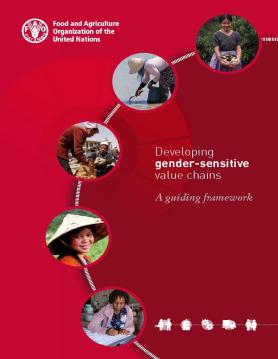You are here
Developing gender-sensitive value chains: A guiding framework
Despite the many advantages of addressing social inequality, gender dimensions often remain overlooked in agricultural development programmes. Value chain development practitioners may find it challenging to mainstream gender within their work, either because they underestimate or are unaware of the relevance of gender dynamics to value chains, or because they need technical support in translating gender equality objectives into concrete actions in the implementation of programmes.
This publication of FAO framework on gender-sensitive value chains aims to respond to this gap and provide technical support to Value Chain (VC) practitioners and decision makers in developing sustainable and gender-sensitive agrifood value chains. It intends to (1) raise awareness and discuss the relevance and benefits of addressing gender equality dimensions in VC development, (2) build a common approach to work on gender-sensitive value chain development, (3) provide concrete guiding principles for the integration of gender concerns into value chain development projects and programmes (the framework is complemented by the Guidelines for practitioners that provide specific tools to support practitioners in designing, implementing and monitoring gender-sensitive value chain programmes).
Chapters in this publication would discuss (1) existing FAO work on gender and value chain development, highlighting areas of strength as well as gaps to be addressed, (2) key concepts in sustainable value chain development as well as in gender equality and women’s economic empowerment and (3) the FAO framework on gender-sensitive VC development, which brings all of these concepts together in order to enhance the potential effectiveness of future VC interventions.
Copyright © 2020 Grow Asia Terms of UsePrivacy PolicyContact Us

